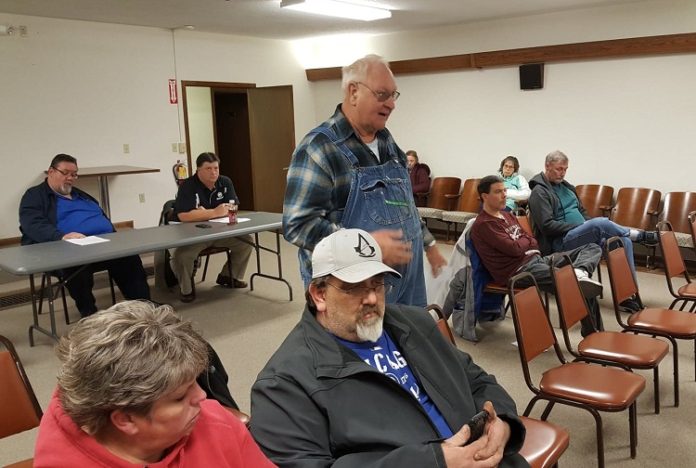
More than 100 Woodward residents recently received letters from the city’s compliance committee, warning them of violations of city ordinances — from having junk in their yards to vehicles parked on their grass — and some residents pushed back at Monday night’s Woodward City Council meeting and on social media.
“What is your definition of junk?” said Chris Sprott of Woodward, who brought his notification letter to the council meeting and spoke in the open-forum portion of the session. Sprott is a reserve officer in the Woodward Police Department.
Sprott’s question was not directly answered, but the process for issuing the letters was described by Woodward City Council member Jim Gough, who chairs the compliance committee and was the point of the speak for residents’ reactions.
“It was basically an informal drive-around, and there was more than one of us,” Gough said. “That letter isn’t a citation. It’s a courtesy letter that says you may have a violation. A lot of this was done back in October, and the letters just went out because the process just took that long. So we expect a lot of these have been taken care of already.”
Sprott encouraged the compliance committee to be specific when identifying the items deemed to be in violation of the ordinance.
“You owe the citizens, if you’re going to write them a citation or even a letter, what your definition is” of junk, he said.
Richard Hartwig of Woodward also challenged his letter’s claim of junk. Hartwig served for many years on the city council and was involved in framing the ordinance he has now allegedly violated. He said he has never had a junk vehicle in his yard.
Gough said it was sometimes difficult to tell on whose property some items lay, but “there was a lot of vehicles that were parked in the grass outside of a driveway or a paved or improved surface that got letters.”
“We encourage people like you to come up here,” the compliance committee chair said to Hartwig. “If you don’t have the violation, if it’s not you, we’d like to know that. With a lot we weren’t sure. There’s a lot that sits between two houses, and a lot of times you can’t tell which place it goes to.”
Gough said the letters were intended as friendly reminders and not as citations or tickets.
“This is just to get the process started so we can start the conversation with people,” he said. “Nobody’s got a ticket, no violation of any kind. This is just saying we’re seeing something that might be, and we’d like to check it out. This is all stuff we’ve just seen from the road and in the alleys. We didn’t go walk through anybody’s yards.”
Hartwig said he parks a vehicle under a lean-to alongside his house, and the vehicle rests on grass.
“What do you want me to do, throw some gravel on that grass?” Hartwig said.
The short answer was yes.
“That is the ordinance, Richard,” Woodward Mayor Todd Folkerts said. “It says that it has to be an improved surface of some type.”
The discussion of the notification letters was as usual less restrained on social media.
“Anyone else having a problem with complaints for having a camper or boat parked in your grass, or do I just have crap neighbors that get bored a lot?” Cody Tigges of Woodward said Monday on Facebook. “I see boats and campers and stalled-out cars parked in yards all over town.”
Tigges’ comment drew numerous responses, ranging from good-natured raillery to outraged indignation.
“Just put gravel down and park it,” Nicole Brewer advised. “That’s what we did. We got yelled at for having a car parked on the grass.”
“I just can’t believe it,” Tigges said. “I can’t go a block in any direction without seeing people with” junk “all over the yard, including cars that have been in the grass since I moved here 10 years ago.”
Tigges said he was “about to dump five tons of gravel in my yard and park the camper on it with a giant middle finger taped to it.”
Several residents said they suspected the letters were the products of personal attacks or vendettas mounted by unfriendly neighbors or a money grab by the city.
“Woodward is notorious for making up offenses and quoting code that does not apply,” said David Whitney of Woodward, whose name appeared on the ballot in Tuesday’s special election. “Chances are the previous council adopted those ordinances for revenue purposes mostly. That’s my guess. In the past, the city would go after individuals a lot.”
Folkerts said the compliance committee was impartial and even-handed in its actions.
“The committee went by the ordinance when they drove around and looked at this,” Folkerts said at Monday’s meeting. “We’re not trying to pick on any one individual. They tried to be fair across the board. They were very conscious of what the ordinance read verbatim.”
Folkerts issued a general invitation to the residents to attend the council meetings and discuss the ordinances.
“This is for the whole community: If you’re in disagreement with the ordinance, you have every opportunity to come and petition the council to look at that ordinance and change it. But right now, those are the ordinances for the city, and that’s what it states,” Folkerts said.
Commenting on Facebook, Sprott said he was satisfied with the compliance committee’s management of the letters, and he urged residents with concerns or questions to talk them over at city hall.
“Anyone which disagrees or wishes to ask for more clarification to any letters that were vague in the verbiage or ordinance reference can contact city hall, and they will have a representative contact you,” Sprott said. “My questions were met with understanding, a promise of action or follow up and a reminder that these letters were not citations, just the first to open lines of communication. I would encourage you and anyone else to open up these lines of communication.”
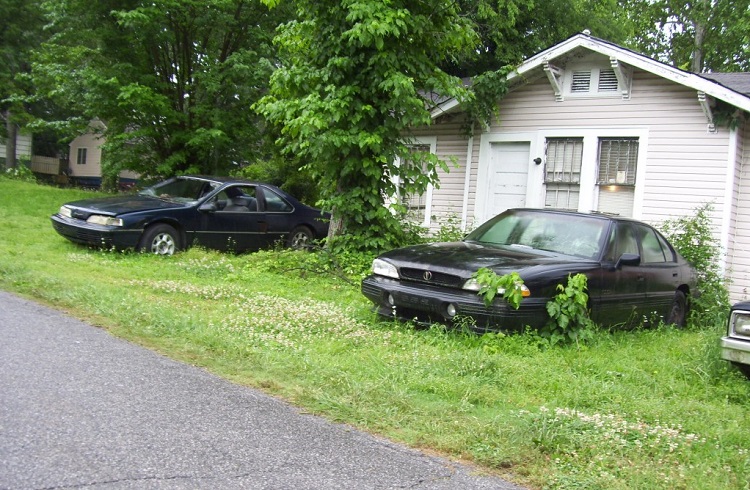






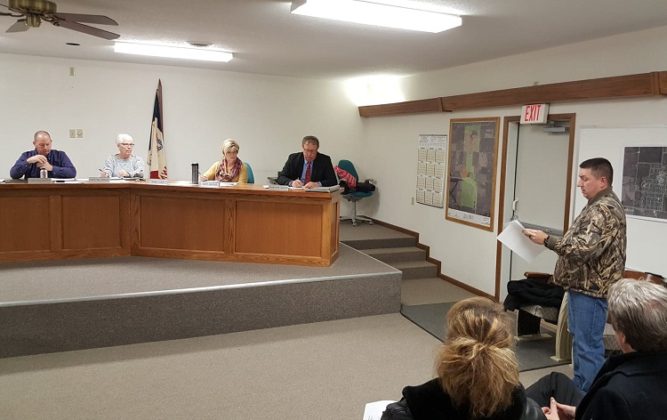
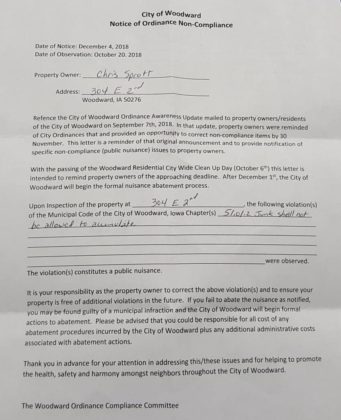
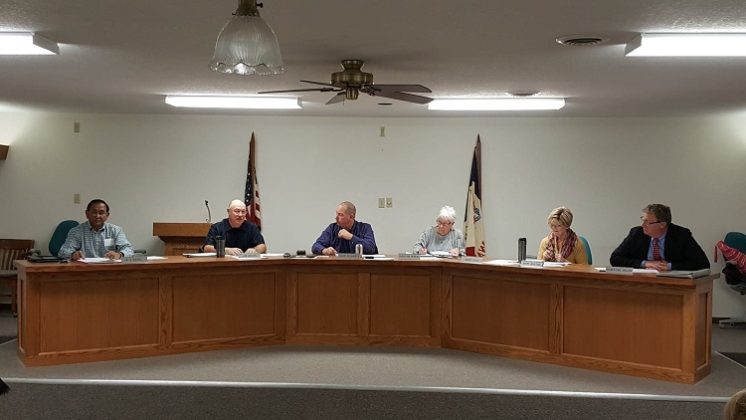











This kind of reaction is typical of those in cities and towns where compliance codes were formerly minimal or nonexistent. Compliance with these kinds of codes are for the benefit of those who don’t have cars parked on their lawns, grass that exceeds two feet in length and perpetual exterior home repair projects. Like it or not, little towns often morph into larger ones. Those who have made serious investments in improved and maintained properties have the right to protect their property values. To be sure, some folks with run down properties may be economically disadvantaged, but others are not so poor they can’t keep their places kept up. Once you could let these things go just like folks could let their dogs run loose. These bad habits just don’t fly anymore. As for the notices that were delivered, no one really received a citation. So what’s the big deal? I’m reminded of what my dear Grandmother Nancy Eakins used to say: “Don’t holler till yer hurt!”
To Kill a Mockingbird
Little towns rarely develop into larger ones and the ones that do are a result of economic development in a larger metropolitan area such as Des Moines’ and West Des Moines’ impact on a community like Waukee.
These following two articles are supported by empirical evidence to uphold that contention.
https://www.thegazette.com/IowaIdeas/stories/regional-development/how-we-got-here-iowas-population-shifts-20180223
https://www.npr.org/2018/06/19/618848050/as-rural-towns-lose-population-they-can-learn-to-shrink-smart
Cities that have successfully followed the path outlined in these articles have focused on cultural, social and educational events and advantages, not lawns and what’s parked in them.
A great read (a collegiate-level, seminal work) on this topic is Edward Glaeser’s book, Triumph of the City: How Our Greatest Invention Makes Us Richer, Smarter, Greener, Healthier, and Happier. In lieu of infrastructure investments, Glaeser emphasizes that focus on education and cultural enhancements is far more important. A great take away from his work; if you want to grow a community positively focus on the schools and other educational opportunities, not streets.
One of the most significant cultural advantages of a small community is the ability to live in the midst of diversity. For example on Woodward’s main street you can see homes that have tax assessments over $200,000 and ones across the street at less than $50,000. On the same block you can find people in their latter years and young couples with children aspiring to reach their dreams and goals. Sadly, most communities in larger metropolitan areas tend to be filled by like-minded people with similar socioeconomic backgrounds and bases (citation: http://www.pewsocialtrends.org/2008/12/02/americans-say-they-like-diverse-communities-election-census-trends-suggest-otherwise/).
The article just referenced proclaims that many people long for the diversity that a small community has to offer. That diversity should be encouraged and emphasized, not bridled, diminished or destroyed by attempting to make everyone conform to someone’s assessment of what is the “correct way to live.” While I have many faults and shortcomings, what is right for me is not necessarily right for you.
Have we forgotten the heart and love of two of the greatest literary reads that emphasize the beauty of accepting others for what they are and how they live,…Same Kind of Different as Me, by Ron Hall and the literary giant To Kill a Mockingbird, by Harper Lee. While our schools are filled with the message of acceptance and individuality while admonishing bullying, what a travesty if is if our communities don’t mirror that. Shall we embrace the horrifically depressing lyrics of Live and Let Die by Paul McCartney or rise up to embrace diversity and the inherent beauty of each unique individual?